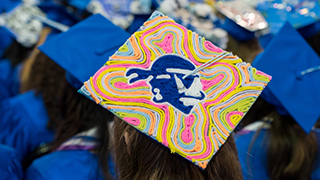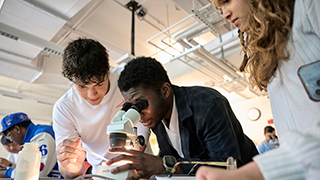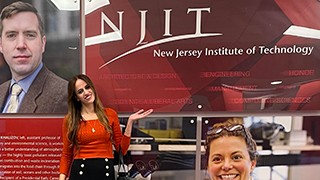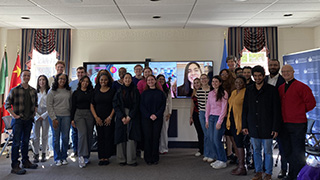Religion Professor Featured in National Catholic Register
Sunday, July 30, 2023
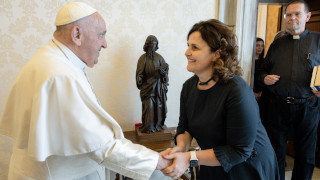
Professor Ines was received in private audience with Pope Francis. (Foto ©Vatican Media)
Ines Angeli Murzaku, professor of religion and director of the Catholic Studies Program, celebrates her private audience with Pope Francis.
For Ines Angeli Murzaku, Ph.D., Professor of Religion and Director of Catholic Studies, July 10, 2023, is a date that she will reminisce about and celebrate each year. That was the date she was received in private audience by Pope Francis.
"We met in the Pope's private library in the Apostolic Palace, which is the official residence of the reigning pope in Vatican City. The setting and the Pope's desk were familiar — it's where the Supreme Pontiff conducts his daily routine and where he receives cardinals, sovereigns, presidents, ambassadors and the heads of Vatican dicasteries," she explained to the National Catholic Register in a July 26 reflection.
These private audiences or face-to-face meetings are often reserved for new Vatican ambassadors to the Holy See and religious and world leaders, so Professor Murzaku considered this a true blessing. The occasion was the visit of her group, headed by Jesuit Father Zef Bisha, the superior of the Society of Jesus in Albania.
They presented Murzaku's book in Albanian translation, Catholicism, Culture, Conversion: The History of the Jesuits in Albania (1841-1946), published by the Society of Jesus Publishing House in Tirana, Albania, and presented to the public on the 10th anniversary of Pope Francis' pontificate. Pope Francis himself writes in the preface of the book:"I am happy for the publication of the book, History of the Jesuits in Albania," she said.
She explained how the new book translation was presented to Pope Francis covered in a mesalle, the traditional woven red-and-white-striped cloth used by Albanian priests to cover prison altars to celebrate secret Eucharist/Mass in high-security communist prisons. And after the fall of communism, mesalle were traditionally woven to symbolize martyrdom – that of Albanian martyr Jesuit Father Daniel Dajani, a key focus on the Pope's 2014 trip to Albania. In 2016, Pope Francis beatified 38 people who had martyrs’ deaths in communist prisons from 1945 to 1974.
"We came from the periphery (Albania) to meet the Pope of the peripheries. 'Go out, head for the peripheries' — this is, in a nutshell, the leitmotif of Pope Francis' pontificate."
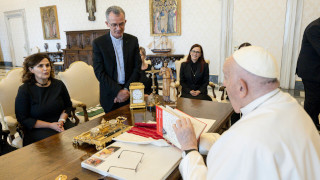
Coming from the periphery (Albania) to meet the Pope of the peripheries. (Foto ©Vatican Media)
Murzaku's extraordinary work has been described by religious scholars as patiently researched with deep reflection. Her scholarly research in the book presented to the pope describes the history of the Jesuits in Albania, a country with a Muslim majority and a Christian minority, that was part of the Ottoman Empire when the Jesuits first set foot there. The book includes new primary sources researched in Vatican and government archives in Italy and Albania.
She wrote: "The attention of the Holy Father to the value of immigrants, refugees and women, all of whom are peripherals and vulnerable in modern societies, is well known. He mentioned during our conversation that a talented 'Albanian woman-surgeon followed him when he was in the hospital,' adding, 'Albanians are doing good all over the world.'"
In fact, on May 18, Murzaku was a speaker along with many noteworthy practical theologians and clergy at a virtual global symposium celebrating the 10th anniversary of the papacy of Pope Francis. Sponsored by the Institute for International Communication at the Lesley H. and William L. Collins College of Professional Studies, St. John's University, this symposium focused on the theme "Fratelli Tutti: Bringing People Together." At the time, Murzaku explored Pope Francis' emphasis on collaboration and brotherhood — in his writing, his preaching, and his actions. Now she found herself personally experiencing his blessed presence discussing and bringing together people in the interest of the common goals of promoting human dignity, the value of the peripheries and peripherals, immigration and martyrdom.
She noted: "Coming from a family of immigrants, knowing firsthand the struggles of immigrants, explains Pope Francis' intimate closeness to the plight of the immigrants and refugees living on the socioeconomic peripheries — their struggle to find employment, stability and acceptance in the host country."
Of this sacred journey, she wrote: "I left the private audience with the Holy Father energized more than ever to continue my academic vocation, dedicated to sharing with my students the matters of the intellect and of the spirit that were reflected in our conversation with the Pope. I am sure that the 40-minute meeting will be as life-changing for my students as it is for me. Thank you, Pope Francis."
The National Catholic Register article is available here.
Categories: Arts and Culture, Faith and Service

